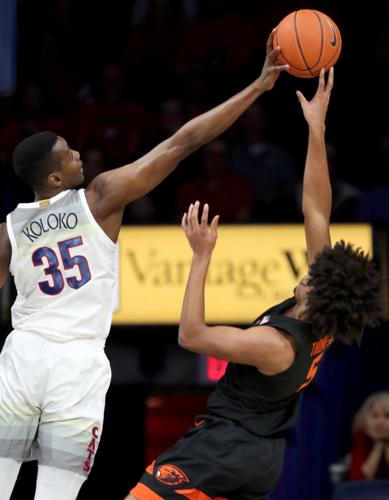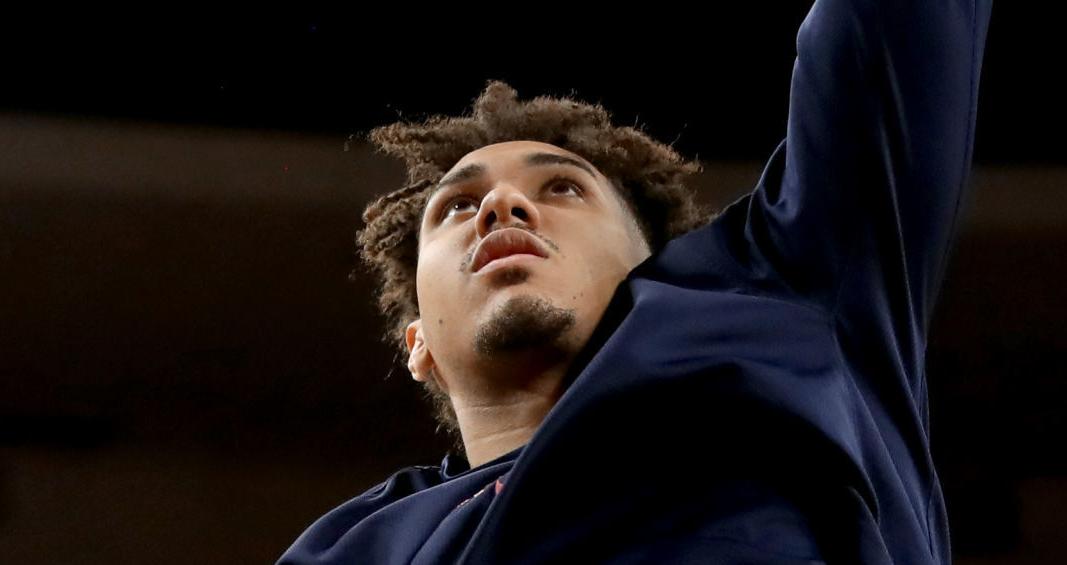The last time the Arizona Wildcats went to USC’s Galen Center, they shot 27.8% from the field and lost by 23 points.
Chase Jeter watched from the bench with back trouble, creating a hole in the middle the Wildcats could not compensate for.
“The team we have right now without him, we have to make shots,” UA coach Sean Miller said after that Jan. 24, 2019, game. “We had one of those miserable nights shooting.”
But when Arizona visits USC on Thursday, Jeter might not play much — if at all. In fact, that’s the expectation.
Jeter slipped out of the Wildcats’ starting lineup after they were swept in Oregon during the second week of Pac-12 play and — due to his lack of rebounding, a combination of other players’ success and a back issue — has appeared in just three games for a total of only 11 minutes since then.
Jeter’s longest appearance came Thursday against Oregon State, when he entered with Arizona up by 19 points and played the final six minutes. Then he didn’t play at all in the UA’s overtime loss to Oregon two days later.
Of course, it’s difficult to make any comparisons between last season’s undermanned Wildcats and the group that is now just a game out of first place. It’s also clear that a lot of the reason for Jeter’s absence has been the emergence of three other players who weren’t around last season.
Jeter’s move from a starting role gave birth to a Stone Gettings-Zeke Nnaji post combo that made the Wildcats more difficult to guard, considering Nnaji’s inside efficiency and Gettings’ versatility. Many of Jeter’s would-be minutes have also poured into Christian Koloko’s development inside.
That’s mostly been good for the Wildcats, who had Koloko on the floor for the final minutes of regulation in their 73-72 overtime loss to Oregon on Saturday. The freshman 7-footer caught a full-court heave from Jemarl Baker and was fouled, but missed the ensuing free throws.
Overall, Koloko is averaging 2.4 rebounds, 0.8 blocks and 0.4 steals in Pac-12 games despite playing an average of just 7.9 minutes in them.

Arizona center Christian Koloko (35) has the reach to reject the shot by Oregon State guard Ethan Thompson (5) in the first half of their Pac12 game at McKale Center, February 20, 2020 Tucson, Ariz.
“When you think about blocked shots, deflections, steals — he’s off the charts per minute played, and he’s done it against very good competition,” Miller said of Koloko. “In the bay against Stanford, he was really big defensively, affecting shots, blocking shots when (opponents) drive. He’s different in that he protects the rim.
“In addition to that he has really good instincts in terms of grabbing a ball with two hands. And I think the other part is for somebody who’s 7 feet tall and a freshman (is that) when he switches onto a guard, he might be the best overall frontcourt player on our team in terms of how he can move his feet.”
Miller has also made it known repeatedly how much he values the look Gettings gives the Wildcats at power forward, a spot Gettings took when Nnaji shifted to center in Jeter’s place. With Gettings as a starter, the Wildcats have a crafty inside scorer who also shoots well enough outside to immediately force defenses to stretch.
Since the Wildcats beat Washington on Jan. 30, Gettings is averaging 10.1 points and 5.1 rebounds per game.
But while the roles of Nnaji, Gettings, Koloko and veteran energizer Ira Lee have become more established in the post, Jeter may yet find a role to play.
“For sure, he could help us this week,” Miller said. “USC and UCLA are both big, physical teams and our depth has to be something we feel good about. We don’t want to wear down late in the year … I thought we had a wearing down effect in the Oregon game.”
Miller then marveled about Oregon’s Payton Pritchard, who scored 38 points while playing all 45 minutes Saturday, but added “I think everything is on our table right now depth-wise. We need contributions from everybody.”
Jeter has not been made available for comment since he was taken out of the lineup last month. But the way Miller described it, the move has not affected Jeter’s approach.
“Chase is a great kid. He’s a leader and he’s really smart,” Miller said. “He’s gone through a lot. His back, I think even now he’s still working his way through it. But he’s practicing hard and his attitude has been great.”
Rim shots
- Miller said he did not have an opinion on an NCAA proposal that would allow players a one-time exception to transfer without having to sit out a year, starting with players who transfer in the 2020-21 academic year.
While some coaches have complained about the proposal, the additional fluidity could help teams — like Arizona — that suffer big roster losses each spring. The Wildcats have benefited from the waiver Kentucky transfer Jemarl Baker received to play this season, and the new proposal would make waivers unnecessary.
“I really don’t know,” Miller said. “It’s for the NABC (basketball coaches’ association) to answer. They’re the leaders of our game.”
- Richard Jefferson is scheduled to work Saturday’s Arizona-UCLA game for ESPN as an analyst alongside Bill Walton and Dave Pasch, according to a tweet from Pasch on Tuesday. “Gearing up for a busy but fun week with a variety of analysts,” tweeted Pasch, who will also work two NBA games and Thursday’s USC-Arizona game with Walton.






